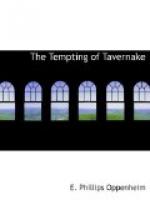“It can’t be done,” Pritchard declared, taking his arm once more. “You’ve got to see me through this. Come up to my rooms for a minute.”
They entered the Court and ascended to the eighth floor. Pritchard turned on the lights in his room, a plainly furnished and somewhat bare apartment. From a cupboard he took out a pair of rubber-soled shoes and threw them to Tavernake.
“Put those on,” he directed.
“What are we going to do?” Tavernake asked.
“You are going to help me,” Pritchard answered. “Take my word for it, Tavernake, it’s all right. I could tackle the job alone, but I’d rather not. Now drink this whiskey and soda and light a cigarette. I shall be ready in five minutes.”
“But where are we going?” Tavernake demanded.
“You are going,” Pritchard replied, “on
an errand of chivalry.
You are going to become once more a rescuer of woman
in distress.
You are going to save the life of your beautiful friend
Elizabeth.”
CHAPTER XXIV
CLOSE TO TRAGEDY
The actual words of greeting which passed between Elizabeth and the man whose advent had caused her so much emotion were unimpressive. The newcomer, with the tips of his fingers resting upon the tablecloth, leaned slightly towards her. At close quarters, he was even more unattractive than when Tavernake had first seen him. He was faultily shaped; there was something a little decadent about his deep-set eyes and receding forehead. Neither was his expression prepossessing. He looked at her as a man looks upon the thing he hates.
“So, Elizabeth,” he said, “this pleasure has come at last!”
“I heard that you were back in England,” she replied. “Pray sit down.”
Even then her eyes never left his. All the time they seemed to be fiercely questioning, seeking for something in his features which eluded them. It was terrible to see the change which the last few minutes had wrought in her. Her smooth, girlish face had lost its comeliness. Her eyes, always a little narrow, seemed to have receded. It was such a change, this, as comes to a brave man who, in the prime of life, feels fear for the first time.
“I am glad to find you at supper,” he declared, taking up the menu. “I am hungry. You can bring me some grilled cutlets at once,” he added to the waiter who stood by his side, “and some brandy. Nothing else.”
The waiter bowed and hurried off. The woman played with her fan but her fingers were shaking.
“I fear,” he remarked, “that my coming is rather a shock to you. I am sorry to see you looking so distressed.”
“It is not that,” she answered with some show of courage. “You know me too well to believe me capable of seeking a meeting which I feared. It is the strange thing which has happened to you during these last few months—this last year. Do you know—has any one told you—that you seem to have become even more like —the image of—”




